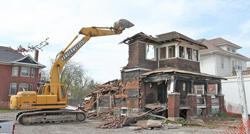Proposed Vacancy Registry Another Sign of Desperation
By Johnny Destino
Desperate times are driving city leaders to seek out solutions to the long-term problem of vacant homes and storefronts in Niagara Falls.
Seth Piccirillo, director of Community Development, is asking the residents of Niagara Falls to voice their opinion on an idea that has proven successful in other communities: the creation of a Vacant Building Registry.
The plan, which would be modeled after a successful initiative in Binghamton, would impose a nominal registration fee, a significant annual fee for owners who have unoccupied buildings, and heightened scrutiny from the code enforcement officers to make sure the buildings are being maintained properly to ensure public safety.
Seth Piccirillo says it's important to get feedback from the community before implementing a program like this but believes something must be done to drive development in the city.
"Niagara Falls' commercial real estate market is upside down. Speculators are asking ridiculous prices for vacant buildings that serious developers and small business start-ups will just not go for. At the same time, these vacant buildings drain city resources, attract crime, and drag down property value. We started talking about the Binghamton law as a strategy in a similar upstate city. We want the public's input," said Piccirillo.
The reaction so far has been mixed according to Piccirillo. A group of attendees at a local symposium held in the city last week on Main Street broke in favor of creating the registry after having toured the Main Street area and witnessing the empty buildings firsthand.
The conversation carried over on Facebook where several people viewed the idea with the equal parts suspicion and enthusiasm.
A Lewiston resident commented that "It's a good conversation to have because there is a problem. However, at first glance the law sounds like money grab –especially because a government job is being created. I think you would need to speak more to how the program was a homerun in a "like" community. I'm not sure the Binghamton example fits this bill or not because I have not heard or read much about that city's revitalization."
With regard to Niagara Falls and Binghamton being apples to oranges comparison, one Niagara Falls resident noted that there could potentially be wildly different types of investors in the two communities and property owners along the Niagara River might be justified in expecting a higher return on their investment than those located in the Southern Tier region.
Another commenter suggested that the speculators were just waiting for non-Indian gaming legislation to be approved by New York State.
While Piccirillo has opened the floor for people to voice their opinions on the matter, we here at the Reporter feel compelled to offer ours.
Creation of such a department or agency would be akin to declaring that we've failed. Why don't we just cry uncle and tap out?
Unfortunately that is what appears to be happening now as cities, whose budgets are strained by equal parts local mismanagement and unfunded mandates from Albany, are left begging, hat in hand, for a state bailout.
Claiming that vacant buildings are the problem is misdiagnosing the disease. Vacancies are a symptom of burdensome tax levies, outrageous utility costs, and onerous regulations that have left our population decimated as businesses and people continue leaving New York. The people left behind are forced to shoulder more of the burden.
Most cities that have departments of economic development work toward facilitating property owners by making sure they are providing the proper environment for them to succeed.
The creation of a vacant building registry in Niagara Falls would be tantamount to penalizing the property owners for the government's own failed policies.
No, our local government needs to better advocate for the local taxpayers, and those "speculative" property owners are paying taxes too.
It was the local government and our state representatives who signed off on a lop-sided, 50-year power authority deal sending our low-cost hydro downstate, leaving us with among the highest electricity costs anywhere.
It's the politicians in Albany whose mandates require Niagara County to pay upwards of 65 percent of their budget every year on social services.
It's state bureaucracies pillaging our natural resources and sending the money our state park generates out of the local economy.
It's government at all levels putting their thumb on the scale and creating disproportionate incentives to seek out help from local IDA's with the authority to make special dispensations to projects they deem worthy, rather than relinquishing that control to allow everyone to benefit from lower property and sales taxes.
Let's not punish the property owners any further. We need to focus on the real reasons why Niagara Falls is in the condition it is in.

